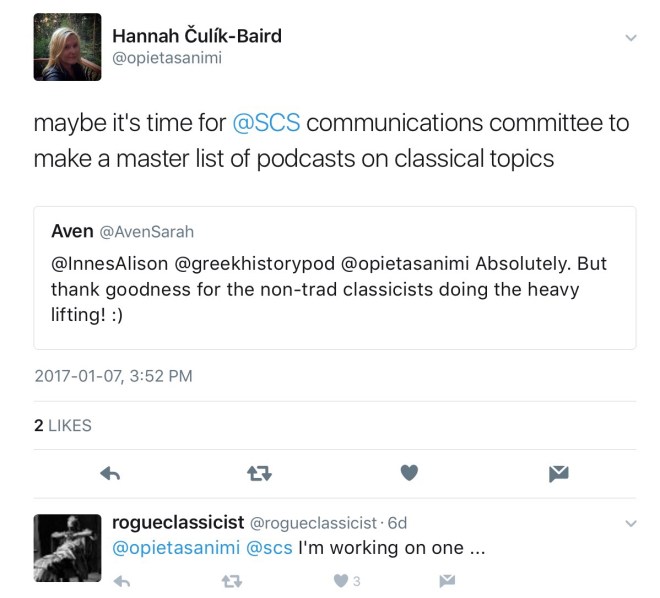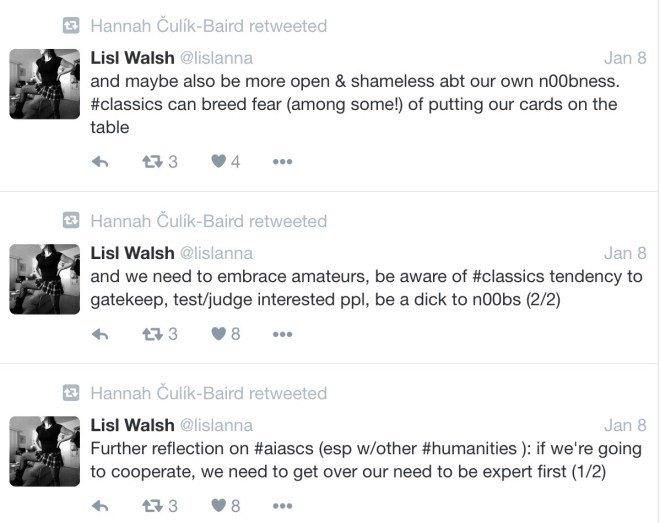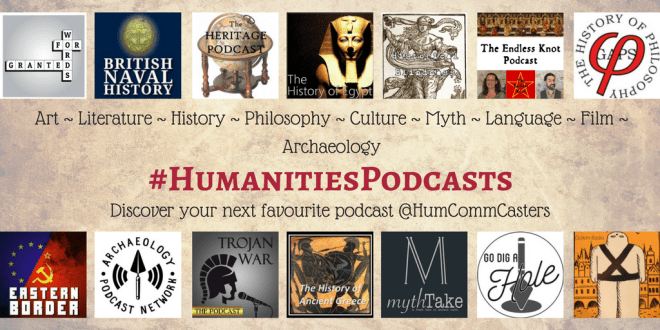It is certainly exciting times for social media in academics, as the current discussion about podcasting in Classics demonstrates.
As Hannah Čulík-Baird shows in her blog post this past week, conversations about Classics outreach and podcasting at this year’s annual meeting of the Society for Classical Studies (SCS) show that the discipline is starting to recognize the power of social media and its importance for the continued survival and growth of Classics.
Podcasting in particular is huge right now. A quick Google search will show a plethora of articles and statistics on its popularity. More people than ever before are listening to and producing podcasts. Now is the time for the discipline to capitalize on this particular social media platform. The social media landscape can change swiftly and timing is an important part of success.

The suggestion was made on Twitter that the SCS could support podcasting efforts by keeping a list on their website of Classics podcasters. As an independent podcaster, I have mixed feelings about this. I certainly welcome support and the idea of having a list to make it easier to find Classics podcasting is definitely useful and appealing.
But while lists are helpful tools to finding information, they need to be done carefully; a list can easily become (or be perceived as) a gate-keeping device. How broadly do we define Classics in terms of geography, time period, etc, for this list? How much of a podcast needs to be about Classics material to be considered for such a list? David Meadows (@RogueClassicists) has clearly considered some of these questions in his list he released today, but these questions do need to be borne in mind to prevent gate-keeping.

Having said that, there are some excellent lists out there. As mentioned, David Meadows (@RogueClassicist) has undertaken the monumental task and produced a fantastic list here. Ryan Stitt of The History of Ancient Greece Podcast maintains an excellent list on his website. There is also the Digital Classicist Wiki, which has a list of Classical Studies podcasts (including video). The nascent #HumanitiesPodcasts network on Twitter (@HumCommCasters) includes some excellent Classics and Classics-related podcasts (including ancient Egypt) as well. I keep a running list on the MythTake blog here and Ray Belli of Words for Granted also has a list here. Chris Francese, who spoke on the outreach panel at the SCS, has this Classics podcast list (which can also be found here).
Bear in mind, of course, that with the rapidly nature of social media, there will never be a fully complete list. New podcasts will (hopefully) be always springing up while others may fade away.
The most important support academic organizations like SCS can offer to academic podcasters is perhaps offering small grants to independent podcasters who, by nature of being outside the university system, do not have access to other funding to defray costs. We do not get into podcasting to make money, but the reality is that our projects, which are of benefit to the discipline, have costs.
While it is cheap and easy to start in podcasting, to continue for any length of time and to produce a quality product, investment of time and funds is necessary. Equipment is an obvious expense; A good, basic podcasting microphone, for example, is easily $100 (Canadian funds).
Podcasts need to be hosted online someplace, and hosting services are businesses. Free plans may suffice for a few episodes, but are quickly outgrown. Plan costs vary by service, by storage amount, and by bandwidth. At the time we set up MythTake, for example, the cheapest plan I found was $60 a year; 18 episodes in, we have hit our storage limit. We are now in the position of having to remove older episodes to make room for new, which is far from ideal.
Website hosting is also another financial consideration. Again, free services may work in some situations, but at some point the podcast is going to need it’s own URL for marketing and promotion.
An informal survey of a few #HumanitiesPodcasts members suggests that between equipment and hosting services, a podcaster might spend anywhere from $200 to $500 a year. Some podcasters use Patreon, with varying success, to defray costs.
The investment of time that podcasters put into our work shouldn’t be overlooked, either. We do our podcasts because we love our subject and we want to share our passion and enthusiasm with others. But it does take time, and I think it’s important to recognize that. Depending on the show format (scripted vs conversational, for example), researching, recording, producing, and promoting might take as much as 10-15 hours per episode. And, as one podcaster pointed out, that is on top of the years of university training we’ve already done!
We podcast out of passion, a desire to stay connected with our material, and a desire to share our subject with the public. Providing small financial resources to defray expenses would send a very powerful message about an organization’s commitment to non-traditional scholarship and actively demonstrate a desire to bring non-traditional scholars on the fringes into the community.
Individuals Classicists also have a role to play in supporting the podcasting community.
The most obvious and perhaps the most simple is simply listening to podcasts and providing supportive feedback. Rating a podcast on iTunes may not seem like much, but iTunes search results are based on podcast ratings: the more highly rated a podcast, the more likely it will turn up near the top of the search. Recommending podcasts to peers and students is also very important.
A more innovative approach, which I have been investigating recently, is incorporating podcasts into students’ learning experience. There are already great podcasts out there about ancient history, archaeology, myth, and literature that would make great assigned listening to replace or supplement student textbooks. There is not only pedagogical value in this, but it also shows our students that Classics is relevant, current, and accessible. The podcasters’ enthusiasm for their subjects comes through in a way that it can’t in a textbook, and the literature we study was experienced by its ancient audience aurally, anyway. Podcasting and video casting is closer to the Ancient Greek experience of literature than reading. (I plan to write more about this in a future post; If you are already doing something like this, please get in touch!)
Those of us at the fringes, who are doing our academics independently through social media, have much to offer the traditional scholarly community. We are already on the front lines of humcomm–sharing the diversity and relevancy of humanities with the public and engaging them in conversation. This work is critical to the discipline’s survival and growth, so our voices need to be a part of this conversation. The SCS’ conversation about supporting social media efforts within the Classics displine will be most fruitful and most effective when non-traditional social media scholars have a seat at the table.

This was a great post. I’m especially enthusiastic about the idea of incorporating podcasts into student learning. I know that many of my students have appreciated both my own homegrown podcasts and the several that I’ve linked them to. They’ve also shared several with me. I’m also glad that you are continuing to raise awareness and acknowledgment for scholars outside the academy, who deserve continued respect and recognition. I hope that the SCS sees the value in having the sort of dialogue that you are looking for.
LikeLike
Thank you for the kind comment! I am in the process of doing a bit of research and formulating my ideas about incorporating podcasts into learning, so look for those in future.
LikeLike
I’d really love to talk to you more about integrating classics into a broader spectrum of teaching. I teach in a grad program in Entertainment Technology at Carnegie Mellon U in Pittsburgh, and I am an amateur classisist (sp?) I want to integrate (sneak?) classics topics into my design classes, and CMU doesn’t have any studies in classics at all, so I need advice. The volume of material can be daunting, and you note above the attitude sometimes exhibited to noobs in the form of ‘what could you know?’ I recently diecovered your wondetful podcast and that led me here. Great post.
LikeLike